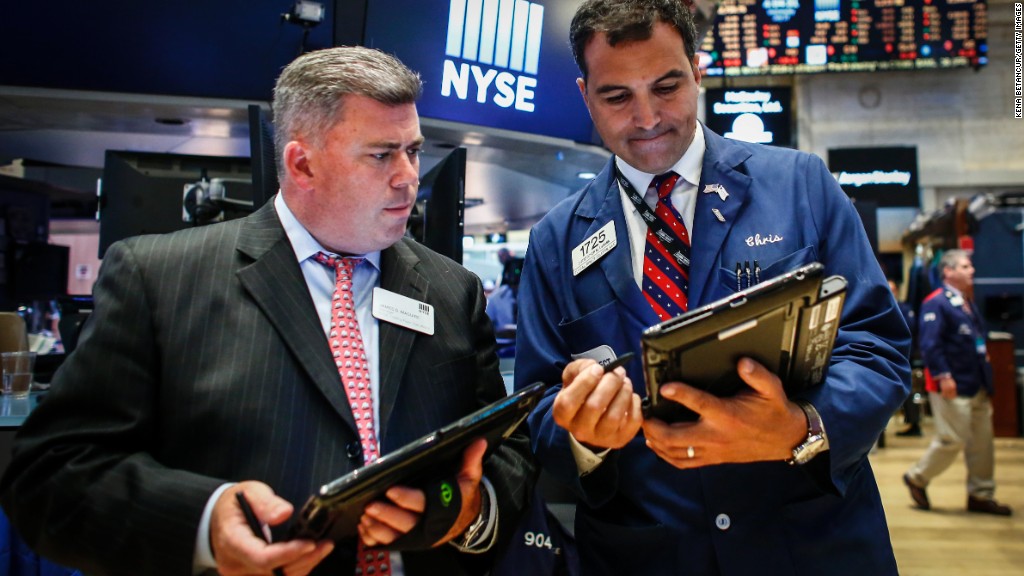
The Federal Reserve is probably not going to raise interest rates when its next meeting wraps up on September 21. And it would probably be insane to do so at the end of its November 2 meeting -- just days before the U.S. presidential election.
But several Fed members -- including, most notably, Fed chair Janet Yellen and vice chair Stanley Fischer -- are talking more about the need to eventually start hiking rates again sometime soon.
The market has taken notice.
According to Fed funds futures tracked by the Chicago Mercantile Exchange, investors are now pricing in a 56% chance of a rate increase by the Fed at its December 14 meeting. (Happy holidays, President-elect Clinton or Trump!)
Bank stocks have rallied lately too. The Financial Select Sector SPDR ETF (XLF) -- a fund that includes JPMorgan Chase (JPM), Citigroup (C), Wells Fargo (WFC) and Bank of America (BAC) among its top holdings -- is up 4% in the past month while the S&P 500 is flat.
What's more, the big bank ETF is up 15% since the Brexit vote in late June -- a clear sign that investors have shaken off worries about political and economic instability in the U.K. and are pricing in higher rates from the Fed at some point.
Contrary to popular wisdom, higher rates would be good for many big banks. Rates have been near zero for such a long time that they have hurt bank profits as a result.
Related: Janet Yellen says Fed rate hike odds have 'strengthened'
Big financials have been practically begging for rates to go up because higher rates boost margins at their lending operations -- and also make it more likely for consumers to start depositing more money in savings accounts again.
Another sign that the market is betting on a rate hike sooner rather than later? The U.S. dollar has picked up steam as well, while gold has pulled back nearly 5%.
The greenback should strengthen if the Fed raises rates since a nation's currency tends to move in the same direction of its interest rates.
And gold should lose some of its luster if rates climb since a big reason for gold's spike this year has been the hope that financial concerns in Europe and China would keep rates lower for longer. Gold often shines in low-rate, deflationary times.
Meanwhile, the Dow Jones Utilities Average (DJU) has plunged nearly 6.5% in the past month. Many investors had been flocking to the big electric companies earlier this year (the index is still up 15% so far in 2016) because utilities pay big dividends.
Related: A Trump presidency would benefit these businesses
That makes these companies more attractive than bonds. But if the Fed is finally ready to start raising rates again, bonds should once again become more interesting to investors looking for steady income streams.
To that end, the yield on the 10-Year U.S. Treasury has inched back up to 1.58% recently. While that is still extremely tiny, it is up from the 52-week low of about 1.34% in early July.
And it's likely that rates could keep climbing after the presidential election -- regardless of who winds up winning.
Joe Quinlan, head of market & thematic strategy for U.S Trust, wrote in a report Wednesday that the end of the "the low-yield, slow growth, super-low interest rate environment" that has lasted for almost a decade should soon end.
Quinlan's rationale? Clinton, should she win, would likely look to boost infrastructure spending. A President Trump would probably push for lower personal income tax rates and a reduction in corporate taxes. And both would increase defense spending.
In Quinlan's opinion, all those outcomes should stimulate economic growth -- which has been meager at best lately -- and increase corporate profits.
Related: Stocks are hot again. But are they too hot?
Of course, it's not clear who will be leading the Fed after the election. Yellen would probably stay at the helm if Clinton wins, although Trump has hinted that he might replace her if he is elected.
Still, the market seems to be betting on the status quo. Clinton has a lead in most polls. And that's probably one of the main reasons why stocks have continued to quietly grind higher lately.
The whipsaw volatility from earlier this year is gone. The Dow, S&P 500 and Nasdaq each hit new all-time highs in mid-August.
It would appear that the market has finally decided to stop fighting the Fed and accept that rate hikes are a sign that the economy is stable, if not spectacular.
In other words, investors are embracing a sense of normalcy in the financial markets -- even though this has been arguably the most abnormal presidential election in history.


